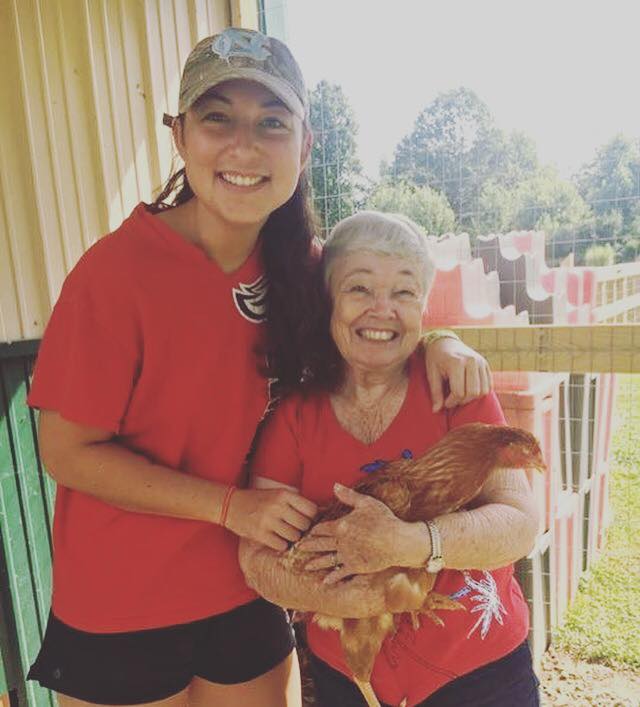The other day when I opened my e-mail, I had a request from a writer to comment on appropriate diets for chickens for an article she was writing. I submit quotes for hundreds of articles every year, so it was no surprise to see this request. What did surprise me was the topic. While we do happen to own a flock of eight chickens, I would say they are pets more than production animals for us.
We originally bought our baby chicks thinking it would be great to have a “free” supply of eggs for the family and the dogs. Buying organic, free-range eggs gets expensive, especially considering we use a few dozen a week. If all eight hens are laying, we get 56 eggs per week. That gives us enough for dogs, humans, and a few extras for friends. It took about six months for our chicks to get big enough to start laying eggs. I dubbed them “the freeloaders” during this period.
In preparation for getting our chicks we had our builder construct a really nice chicken coop in our existing pole barn, with a little sliding door leading to an outdoor enclosed pen with a tin roof. The wire had to be cemented into the ground to prevent predators from digging under the fencing to get to the hens. Initial cost: $1200. (At $5 per dozen eggs, we needed to gather our first 240 dozen eggs.)
Weekly food for the chickens includes organic pellets, a “Flock Block” treat of compressed seeds and grains, and bags of mealworms because they love them. Each bag of pellets costs $25, the Flock Block is another $20, and the worms are $40 a bag. This combination will last about 3 weeks, so average cost is almost $30 per week. (That’s 6 dozen eggs per week.)
However, chickens don’t lay eggs all year round. Ours just went through their first molt (they are 18 months old now) and they were darned ugly, naked, cold birds. I attempted to put a sweater on one shivering bird and wish I had taken video – it didn’t work out so well.
After molting, the chickens take a break from laying for a couple of months. No eggs for the past few weeks. The other day my mother proudly came in from the barn with ONE egg (after weeks of no eggs). Guess who are being called freeloaders again?
The chickens provide a great way to recycle kitchen waste. They love meat and bone scraps, fresh fruits and vegetables, and leftovers from the fridge. I did discover in my research for the requested article that chickens should never be fed raw beans and should not be allowed to forage in gardens for raw beans (good to know). They should also not be fed green tomatoes or green potatoes (also good to know). I already knew birds cannot be fed avocado or avocado peel. Our chickens love eggs and eggshells, which provide a good source of calcium so that they make good shells when they lay eggs. Some chickens will become cannibals and eat their own eggs when fed eggs, but ours have been good so far.
While we absolutely are NOT saving money on eggs, my mother definitely loves her chickens. She faithfully feeds and waters them, lets them out of their pen for a few hours every day (weather permitting, heaven forbid they would get wet!), and cleans up after them. They follow her around the yard and sometimes come up to the house looking in the windows for her.
The chickens are tougher than our dogs and cats. When we first started letting the chickens out to “free-range”, the dogs were very interested in the new beings in the yard. But the Rhode Island Red hens are pretty fierce. They actually chased our dogs! (Again, missed video opportunity.)
I don’t think I’ll be taking chickens on as patients in the future. My poultry class in veterinary school was taught by an instructor with a foreign accent. It took our class three weeks to figure out he was not talking about chicken lips (which is what it sounded like he was saying) – he was talking about chicken ribs. I learned in poultry class that when your flock is sick, you slaughter a few chickens to do a necropsy to determine the disease causing the illness. I’m pretty sure my mother is not going to let me slaughter one quarter of the flock if they fall ill.
When I was younger, my grandfather had a pet rooster named Clarence. Clarence spent his day wandering around the yard outside and at night he came into the house and roosted in their basement (dirt floor, very old house with very old basement). Each morning Clarence would come up from the basement and crow on command (my grandfather got up at 4:00 every morning). When the post office opened the two of them would walk down the street to collect the mail. (Before the days of video, but really wish I could capture that!)
When Clarence passed away, I bought my grandfather two fancy chickens. I was very proud that I had found chickens that were beautiful, but my grandfather was unimpressed. He built them a pen in the garage, but never taught them tricks or took them for walks. When they became ill a few years later, he asked me what to do for them. When I told him I would need to sacrifice at least two from the flock to determine the cause of disease, he was wise enough to figure out his flock would be wiped out. He never asked me for chicken advise again.

